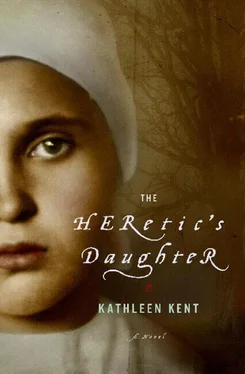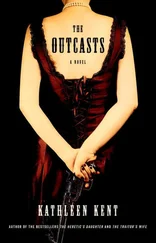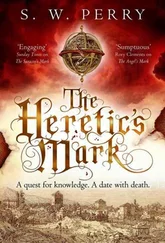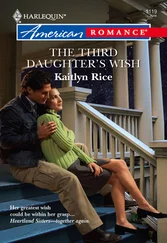That Sunday morning, Mercy had crawled into the cart with me until she saw that Richard would be walking behind us. She gave up her place to Andrew and walked next to Richard the whole way into town. I thought, uncharitably, that even with a fresh cap and apron she looked unkempt and not too very clean. Richard might as well have been walking alone, though, for all the attention he gave to her chattering mouth. After a few miles her breath gave out and they continued their walk in silence. Mother glanced over her shoulder a few times and, had her looks been barbed arrows, Mercy would have been dropped to the dust like a Norman at the hands of a Welsh bowman. I wondered what sparks would fly if Iron Bessie were applied to Mercy’s backside, as she was every bit as large as my mother. She told me once she would knock senseless anyone who mishandled her.
Walking into the meetinghouse was a cold and cheerless affair. The insistent buzzing and clacking about of our neighbors ceased the instant we passed from the sunlight of the yard into the dark of the sanctuary. I looked about and saw many pairs of eyes turned to us. The silence was so great I could hear the mourning doves nesting in the rafters. The Reverend Dane, sitting at the front, turned and with the briefest of nods bid us enter and be seated. I wondered if Mother would find a place in the back, but she walked with the pride of a queen to the place where her mother had sat for many years. At first the row of women would not yield. But my mother placed her foot in the pew and it was either part to give us a place or be sat upon.
The last time I had attended the Andover meetinghouse, I had heard the welcoming voice of the Reverend Dane. It was a different matter when the Reverend Barnard let loose his dark visions upon the people, for though his voice was like creek water over soapstone, his message was ominous. Friend to the great theologian Cotton Mather, he was a minister of ferocious and unshakable belief that God was as hard as bedrock. He often used Mather’s sermons, his favorite being the vengeful Deuteronomy: “Their foot shall slide in due time.” On that day he began with Joel, chapter 2, and the promise of “a day of darkness and gloom.”
He finished sweetening the sermon with the story of Job and his running sores. It would have taken a fool not to see the thread he was trying to weave. The suffering of Job and the horrors of smallpox. There were many, hearing these words, who threw hooded and disapproving looks in our direction, making my palms damp and chilled. A hunted rabbit, finding no warren or cover, will run itself to ground and die before a fox can catch and devour it. But, if the rabbit turns and faces the fox, the rabbit will become rigid with fear and die fully aware of the jaws closing around its head, the fox’s eyes doing the hunting before his teeth. I followed Mother’s lead and stared at a place on the wall above the minister’s head.
At the end I walked out into the light and stood looking for Lieutenant Osgood’s little black slave. I did not see him but did spy Mercy whispering and tittering to another girl near her age. Their heads were close together, and when I approached, they pulled apart and looked at me with blank faces, as though I would not know they had been talking about me. The girl’s name was Mary Lacey, and within the space of minutes, she had told me of all the young men vying for her favor. I did not miss the look Mercy threw Richard, and when she told me in a bold and bossy way to leave, I planted my feet and locked eyes with her. With a shrug Mercy continued her gossiping, which had in the main to do with all the unmarried men in the village.
“Oh, look,” said Mary, averting her eyes suddenly. “There is Timothy Swan and his brothers.”
I saw a smallish man talking to three younger men. He was bowed at the shoulders with a sallow cast to his skin.
Mary said, “Robert Swan is married now, but Timothy and John are not. Timothy has been ill of late.” And here she bent to whisper something in Mercy’s ear. They covered their mouths to stop up their laughter, but the sound carried and several of the old women coming out of the meetinghouse frowned. I looked back at the men, and there stood Allen Toothaker among them. The look he gave me brought back the dank air of his father’s cold-cellar. Mary grabbed at Mercy’s sleeve and, lifting her chin back towards the men, said, “And there is Allen Toothaker, come from Billerica to live with the Swans until he can get his own homestead. He thought he had one” — and she looked pointedly at me — “but it seems someone got there first. He is your older first cousin, isn’t he, Sarah?”
I felt a tug at my elbow and heard Tom at my shoulder say, “It’s time to leave. Mother is waiting.” He pulled insistently at my arm until I followed him back to the cart. It took Mercy a while longer, for she had hoped that Allen would cross over to speak to her, but he had walked away through the sloping, clover-filled mounds of the burial grounds. On the way home Mercy walked close to Richard as before, but, trying a new tack, she feigned injuring first one ankle and then the other. Richard aided her by handing her a stout stick and a water skin and continued his wordless, dogged march behind the cart.
THE WORLD THAT spring looked a continuous freshening color of green, as if it had been made from some vast limitless bolt of linsey-woolsey. The trees bloomed in delicate laces of pink and white, and ivy crept beyond the shadows of the hawthorn bushes. Wild violets bloomed on the banks of Roger’s Brook, and tall grasses bowed double in the wind. On such a morning Tom found me hoeing in the garden, and after he had tortured me for a time with his sighing and restless toe tapping, I asked him what the matter was. I knew something worrisome had been catching at his thoughts, but Tom often ruminated over little things far past the time of their usefulness.
He finally said, “Do you remember Sunday last when we were to town and Allen Toothaker was there?” I had remembered Allen’s skulking movements through the cemetery as he left the meetinghouse but thought it an attempt to keep from Mercy’s company. Tom moved closer as if wishing not to be overheard and said, “I’m afraid of him.” His face was pale, as though his breath had been pinched off. I tore loose some clods of dirt with my hoe and thought of Allen’s close-set, hateful eyes near mine when he said Father was to blame for bringing the pox. And of how we had usurped the Toothakers’ right to Grandmother’s house. I said carelessly, “Allen is a jackdaw, full of more swagger than sense.”
Tom shook his head, saying, “In March, when you were with Margaret, Allen came to us to speak to Mother. He said his mother, Mary, was the oldest of Grandmother’s children and by rights should own this homestead. But Mother accused him of laying claim to the house for himself.” Tom took the hoe from my hands and pulled me to hunker down in the rows of corn, not yet knee-high. The memory of the visit agitated and unnerved him to the point of tripping over his own words. I gave him the hem of my apron to wipe his face and calmed him for a moment before letting him continue. “There was a terrible row. Mother clapped her hands in front of his face and told him he would get nothing by it. And that he would get the house only over her corpse. Then Allen said, as angry as I’ve ever seen a man, ‘That may well be.’ ”
“Where was Father?” I asked, imagining Allen would have gotten more than a hand in his face if Father had been near.
“Hunting with Richard. Mother chased Allen out with a broom. I had gone to the yard to escape the shouting. I was holding the reins for Allen’s horse, a fine roan gelding, thinking to do him service.” The beautiful red coat of Bucephalus came to mind, and I knew that Allen could only have ridden him with Uncle’s blessing.
Читать дальше












